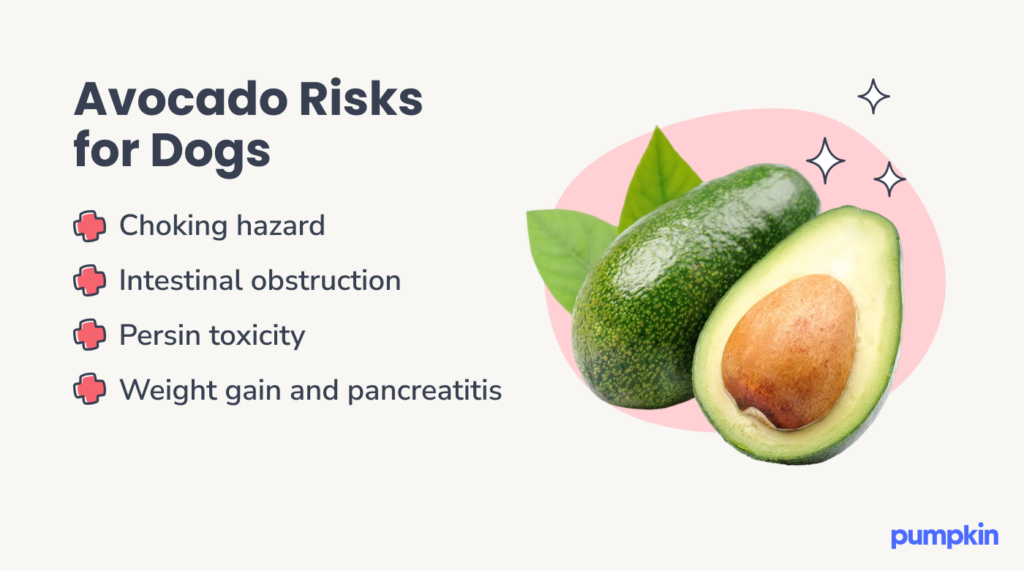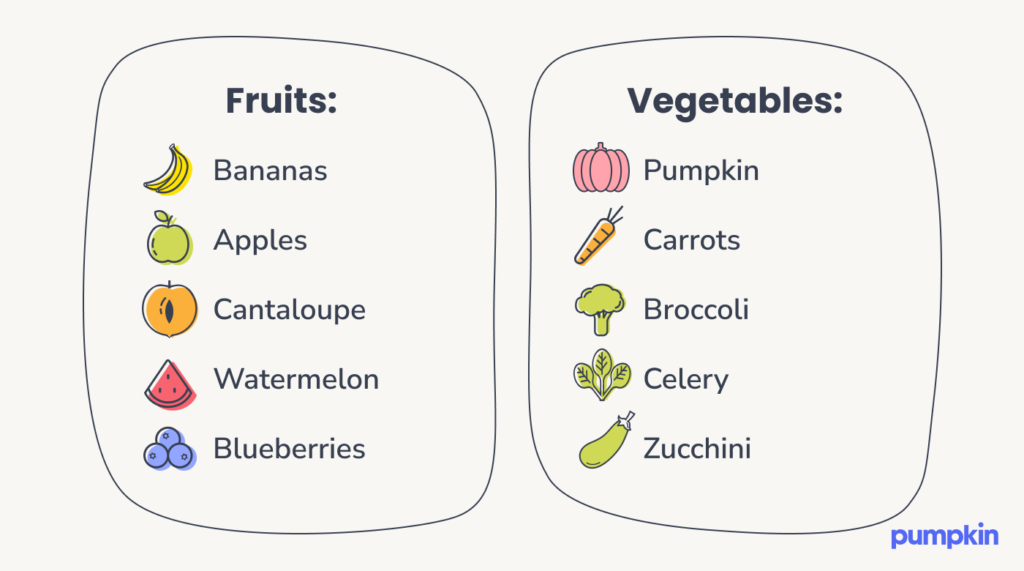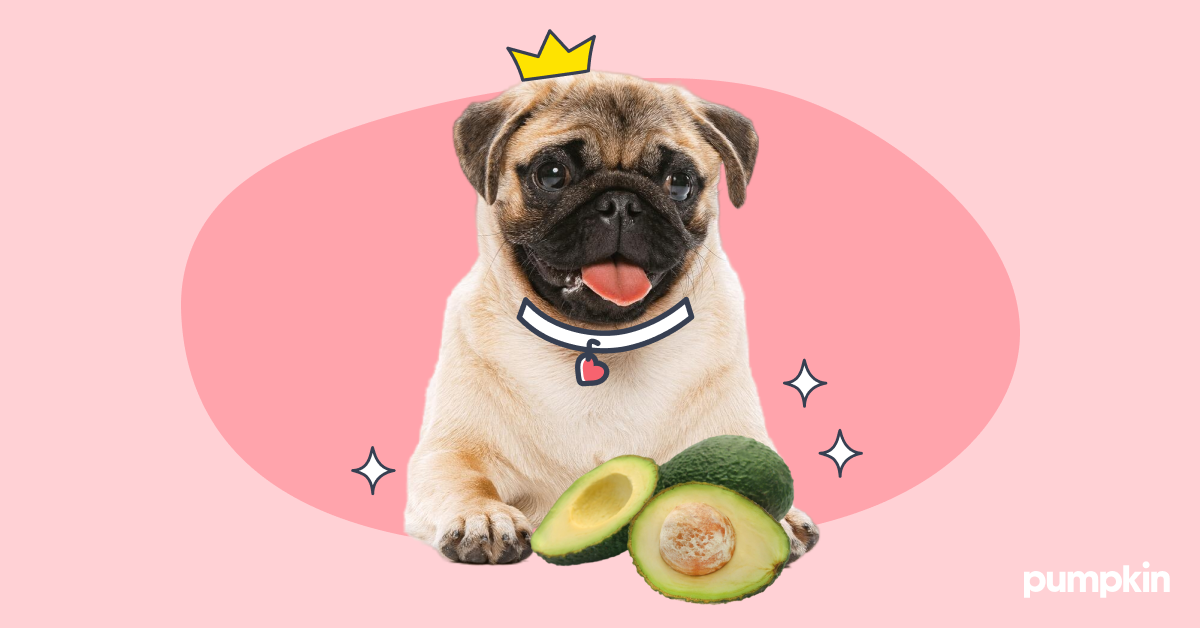Key Points:
- Avocados are a superfood for humans, but they aren’t safe for dogs.
- The avocado pit and skin contain a toxin known as persin.
- Avocado ingestion can also lead to weight gain and pancreatitis.
You’re standing at your kitchen counter preparing dinner when a large chunk of avocado falls to the floor. Your dog rushes in, grabs the chunk, and swallows it before you can stop them.
Now you’re in a pickle. Can dogs eat avocado? Do they need to be rushed to the vet’s office? Fortunately, unless your pup has gobbled up an entire avocado — skin, flesh, pit, and all — they’re probably going to be fine.
While a small piece of avocado is usually okay, avocados are not generally safe for dogs to eat. (The same goes for puppies, too). For humans, they’re packed with healthy fat, fiber, and nutrients. For dogs, the risks outweigh the rewards. Sadly, that means your pup should never know the joys of chips and guac.
Discover exactly how the various parts of the avocado might affect your pet and when to take action if your dog accidentally eats one.
It’s not safe for dogs to eat avocado
The avocado fruit (yes, it falls into the fruit family) is a superfood for humans — full of health benefits like fiber, omega-3 fatty acids, antioxidants, and potassium. No wonder we love our avocado toast. But it’s not a healthy option for our pups.
Dog parents can safely share many vegetables and fruits with their pooches, and many are even recommended as part of a balanced diet. However, avocados aren’t one of the people-foods on that list.
Only a very small amount of the flesh is safe, and other parts of the avocado contain a compound that’s toxic to dogs. Ultimately, because there are serious health risks, this is one tasty food to keep out of your pet’s diet.
Avocado risks pet parents need to know
Avocado trees contain a fungicidal toxin called persin. The concentration of persin is highest in the avocado peel, leaves, and pit, but low amounts of persin are contained in the flesh as well.
Persin is not as toxic to dogs as it is to other animals, such as horses, birds, and rodents. However, adverse reactions like stomach upset, vomiting, and diarrhea can occur. This can be really distressing to a pet owner who isn’t sure whether to take their pup to the vet right away or wait out the symptoms (more on this shortly, we promise).
Weight gain and pancreatitis risk
Avocado’s high fat content can also lead to weight gain and the risk of pancreatitis in dogs. Symptoms of pancreatitis include abdominal discomfort, vomiting, diarrhea, fever, lethargy, and a decreased appetite.
Overweight dogs also run a higher risk of health issues that can shorten their life expectancy. When a pup goes beyond their recommended weight, potential risks include:
- Diabetes
- Hypertension and heart disease
- Osteoarthritis and joint problems
- Bladder stones
- Some types of cancer
Persin poisoning and choking from avocado pits
Avocados have a large pit, which is the most concerning portion of the avocado for your pet. So, the next time an avocado pit accidentally goes flying across the kitchen, make sure your pups don’t mistake it for a ball.
Avocado pits have the highest levels of persin, making them the most toxic to dogs. The pits can also be a choking hazard. Dogs can’t digest the fibrous pit if it’s ingested, which could lead to an intestinal obstruction. The only treatment for intestinal obstructions is often an expensive emergency surgery.
Pet Pro Tip: If you have a dog that is prone to ‘snacksidents’ – you should consider getting a dog insurance plan as soon as possible. It can help you afford the best care in the future by covering eligible vet bills for digestive illnesses, toxic ingestion, and more.

What should I do if my dog eats avocado?
There are few things more frightening for a pet owner than watching something go into your pet’s mouth (and down their throat) that you didn’t offer them. Is it going to make them sick? Do they need to go to the vet right now?
If that something is a piece of avocado flesh, don’t panic! Many dogs are just fine after avocado ingestion, depending on which part and how much of the avocado they ate. Let’s dig into the details to determine your next step in caring for your pooch.
Avocado flesh
If your dog eats small amounts of avocado flesh, they will more than likely be okay. Avocado flesh contains the smallest amounts of persin in the entire avocado, making it the least toxic for your pet.
Keep an eye on your dog for 24 to 48 hours, watching for vomiting, diarrhea, or a decreased appetite. Report severe symptoms to your veterinarian right away to see if your pet requires treatment.
Avocado skin
The avocado peel contains a higher concentration of persin than the flesh, but not typically enough to be toxic. Like avocado flesh, if your dog eats the skin, keep an eye on them for 24 to 48 hours to see if they exhibit worrisome symptoms like vomiting.
Report any concerning symptoms to your veterinarian right away. Prolonged vomiting or diarrhea should also be relayed to your vet since they can lead to dehydration.
Avocado pit
Since the pit is the most concerning part of the avocado plant, you should contact your veterinarian for recommendations.
Some dogs will be able to pass the pit through their system, suffering only from stomach irritation and gastrointestinal issues. However, it’s impossible to know whether the pit will pass or become an intestinal blockage. If you see your dog vomiting, straining to poop, in pain, or growing lethargic, take them to the vet immediately.
The pit can also be a choking hazard, so keep a close eye on your pet once the pit goes into their mouth. If your dog shows any signs of breathing difficulty, this could indicate your dog is choking, a true medical emergency.
Avocado leaves
The avocado leaves are another concerning part of the plant and contain high levels of persin. If your pet eats any of the leaves off your avocado plant, keep an eye on them for vomiting, diarrhea, and abdominal pain. They might also have difficulty pooping, so you may see them strain when you take them for a walk.
What if my dog eats guacamole?
Guacamole can be particularly dangerous to dogs because it often contains other toxic ingredients such as onion and garlic. Dogs that eat even a little bit of guacamole should be monitored very closely.
You can also contact the ASPCA Animal Poison Control for more information. They can answer any questions you might have on the spot and let you know if your pup needs immediate medical attention.
Are there safer avocado products for dogs?
While raw avocado poses risks for dogs, some avocado products are safe and may even provide nutritional benefits. In fact, you may see avocado derivatives on ingredient lists for dog products.

Avocado oil
While no type of oil should be given to dogs in large quantities due to the high fat content, avocado oil doesn’t contain any persin and is considered completely non-toxic to dogs. Applied topically, avocado oil is also beneficial for your dog’s skin and coat, which is why you’ll find it in grooming products.
Avocado meal
Avocado meal is avocado flesh that has been dried and ground. It does not contain persin and offers a healthy source of fiber for dogs, which is why you will find avocado meal on the ingredient list for some commercial dog food brands.
Safe human food alternatives for your dog
For pet owners who like to share their meals with their dogs, there are many safe options. Dog-friendly fruits and vegetables offer many different vitamins, minerals, and antioxidants that can be great supplements when given with high-quality dog food. Foods like plain, cooked chicken and eggs can also be safe to share. With so many nutritious and delicious options, your pup won’t miss avocados one bit.
Try these fruits and veggies instead:
- Apples
- Bananas
- Blueberries
- Broccoli
- Brussels sprouts
- Cantaloupe
- Carrots
- Celery
- Green beans
- Pumpkin
- Watermelon
- Zucchini

Every pet owner has had a day where their pup nabs something from the floor or trash and eats it before you can stop them. The quick ingestion is followed by hours or even days of worrying about whether the food will make them sick.
You want to call the vet, but it’s not always easy to know what justifies a vet visit — and vet costs. A Pumpkin pet insurance plan can help you afford the right care for your dog when they get sick or injured in the future. So, the next time they snatch a forbidden snack from the floor, you can breathe a little easier.
- Avocados, The Nutrition Source, Harvard T.H. Chan School of Public Health. (2022, April).
- Avocado Toxicosis in Animals, The Merck Manuals, Merck. (2021, June).
- Intestinal Blockage in Dogs: 8 Signs to Look Out For, VetMed Consultants.
- Animal Poison Control, ASPCA.




